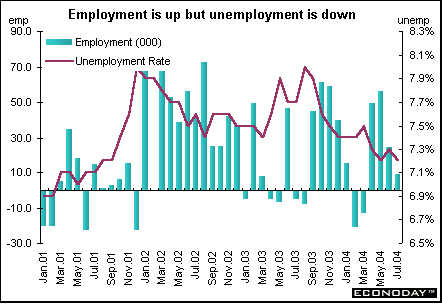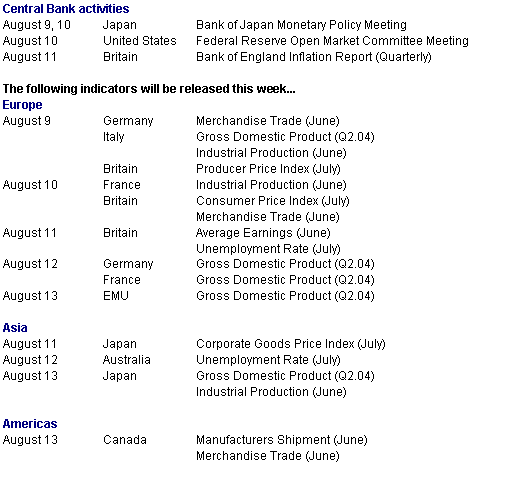Monday, August 9, 2004

One for three
The three central banks meeting last week offered no surprises. The Reserve Bank of Australia and the European Central Bank left their interest rates at 5.25 percent and 2 percent respectively and the Bank of England increased their rate by 25 basis points to 4.75 percent.
Australian borrowing costs have not changed in 2004 even as global growth has picked up and central banks in the United States, England and New Zealand have raised rates. That's because two rate increases late in 2003 did their job, cooling the housing market and keeping the inflation rate within the central bank's target range. The Bank doesn't release a statement explaining its decision when rates are unchanged. It will publish a quarterly commentary on the economy on August 9th.
The European Central Bank caused little stir with its expected decision to leave interest rates on hold. European central bankers traditionally enjoy a holiday in August - the meeting was held by teleconference with no press conference afterwards. This means that the Bank's monthly report available on August 12th will receive more scrutiny than usual. The introductory remarks usually parallel ECB President Jean Claude Trichet's opening press conference remarks.
Only the Bank of England continued on its path of increasing interest rates. This was the fifth in a series of 25 basis points that began in October 2003. Housing prices continue to soar and consumer debt is hitting all time highs. While inflation remains under the Bank's 2 percent target, it has been climbing since March.
Global Markets
While equities kept their cool and had pretty much discounted the central bank meetings, it was the yoyo news about oil supplies that hurt during the week. Even heightened terrorism warnings in the United States had a muted effect on traders. But it was Friday's U.S. employment situation report that really gave grief to markets in the Americas, Europe and Britain. Asian markets were closed as usual by the time the report was released and will react on Monday.
Contradictory remarks from both OPEC and Russia unsettled investors as crude prices bounced with each statement. First an OPEC representative said there was no excess capacity available to bring down record oil prices, only to be contradicted the next day by the Saudis who brought new supplies on stream. Then there was the ongoing saga involving Yukos, Russia's largest oil producer. On Wednesday, an announcement was made that the firm would have access to its impounded accounts, which would enable it to continue to pump oil, only to be contradicted by another announcement that the company would not have access to the accounts. The Justice Ministry said it withdrew a letter it had sent to Yukos giving permission for the company to use accounts that had been frozen over the longstanding tax dispute. That was the second time in a week that the ministry has withdrawn an order sent to Yukos or its units.
The miserable week is evident in the table below. On the week, 11 of the 13 indexes followed here sank. Only the Hong Kong Hang Seng and the Singapore Straits Times were up on the week. The Nasdaq, down 5.9 percent, was the worst performer with the DAX following, down 4.3 percent.
Global Stock Market Recap

Europe and Britain
On Monday, the CAC and DAX declined, led by travel-related companies and especially airlines after an alert over possible terrorist attacks in the United States sparked concern about security and pushed oil to a record high in New York. Technology companies and automakers were especially hurt through the week on concern that rising energy costs may hurt consumer confidence and corporate profits. The FTSE, CAC and DAX then sank anew on Friday after the U.S. employment report blind-sided analysts who were looking for a 200,000 job increase, only to get 32,000. Friday's declines for the three indexes, which are under their December 2003 levels, were the steepest since April.

Asia/Pacific
Another day, another excuse for falling prices on Asian markets - at least that's the way it seemed when the week began. On Monday, Japan's Nikkei 225 Stock Average lost 0.9 percent while South Korea's Kospi index slumped 2.1 percent, its biggest drop since July 8th. Shares of exporters also declined after a U.S. GDP data on July 30th showed the U.S. economy slowing more than analysts expected in the second quarter. Analysts in Asia said the threat posed by terrorism is very difficult for investors to gauge and hurts market sentiment. And a slowdown in the U.S. economy isn't just a short-term concern but a long-term reality, which makes it difficult to be bullish on stocks.

Japanese stocks fell, led by carmakers such as Toyota Motor Corp. and Nissan Motor Co., on concern slowing domestic sales growth and rising steel costs will erode earnings. Disappointing U.S. consumer spending didn't help to lift the gloom.
But a mid-week reversal in oil prices pushed Asian stocks higher, led by exporters such as NEC Corp. and Hyundai Motor Co. Oil prices have been a concern for the market, so any drop becomes a trigger to buy. Hong Kong's Cathay Pacific Airways Ltd. and Singapore Airlines Ltd. led their respective indexes higher on optimism that jet fuel costs will drop.
Currencies
The approach of the U.S. payrolls report dominated foreign exchange markets through the week, subduing dollar moves against other major currencies and pushing investors looking for action towards more exotic trades. On Thursday, a dip in U.S. weekly jobless claims gave the dollar a slight boost as market participants added each piece of information about the jobs market to their calculations for Friday's payroll figures. In the end, they didn't add up. Analysts said the combination of thin summer trade combined with the ongoing search for direction will create a lot of volatility, which might be further intensified by terrorist rumors.

On Friday the dollar plummeted, especially to the benefit of the euro, following weak U.S. payroll growth. Also gaining ground was the yen, which had been pressured earlier in the week by the drop in Japanese stocks.

Indicator scoreboard
EMU - June seasonally adjusted unemployment rate remained at 9 percent for the third month. Spain continued to show the highest unemployment rate at 11.1 percent while Germany followed at 9.8 percent, France at 9.5 percent, Finland at 8.8 percent and Belgium at 8.6 percent. Luxembourg and Austria showed the lowest unemployment rate at 4.2 percent. It is estimated that 12.7 million people are unemployed within the eurozone.

June industrial producer prices were unchanged but were up 2.4 percent when compared with last year. A drop in energy and durable consumer goods offset higher capital, basic and nondurable consumer goods prices. Energy prices were down 0.5 percent and 4.4 percent on the year. Excluding energy, the PPI was up 0.1 percent and 1.9 percent on the year.

July seasonally adjusted manufacturers purchasing managers index inched up to 54.7 from 54.4 in the previous month. The PMIs for Germany and Italy were up while the index for France declined. Output prices were up for the EMU, Germany and France but down in Italy. A reading over 50 signifies expansion. However, the EMU employment index still remains under the 50 breakeven level. The indexes are compiled by NTC Research of Britain.

July seasonally adjusted services purchasing managers index remained at 55.3 for a second month. Germany's index was up but those for France and Italy were down. EMU new orders, input prices and employment indexes were down from June's levels. The composite index which combines the services and manufacturing index climbed to 56 from 55.6 in June.
June real workday and seasonally adjusted retail sales jumped 1.8 percent and were up 1.2 percent when compared with last year. Both food and nonfood sales were up on the month.

Germany - July seasonally adjusted unemployment rate rose to 10.6 percent - an 11-month high - from 10.5 percent in June. The level of seasonally adjusted jobseekers rose by 11,000 to 4.39 million, the sixth straight monthly increase. The unemployment rate in east Germany remained at 18.5 percent while the rate in the west climbed to 8.5 percent from 8.4 percent in June.

June manufacturing orders plummeted 3.5 percent but were up 4.1 percent when compared with last year. Both domestic and foreign orders sank. Domestic orders were down 0.8 percent while foreign orders sank 6.5 percent. However, the June data are likely to be upwardly revised, according to the Economics Ministry. Revisions to the orders data are typically available about two weeks after the original release. The overall decline was attributed in part to a decline in bulk orders that was well below normal. All major categories paced by capital goods sank.

June industrial production sank 1.9 percent but was up 2.2 percent when compared with last year. Manufacturing was also down 1.9 percent. In addition to manufacturing, energy output sank 2.4 percent. However, construction output managed to increase by 0.4 percent. Most manufacturing subcategories declined including capital goods, consumer durables & nondurables and intermediate goods.

Britain - July Halifax house price index was up 1.3 percent and 22.3 when compared with last year. According to Halifax, the latest data suggest the market may be slowing. They also said the June and July increases were significantly below the average monthly rise of over 2 percent during the preceding six months. The average property price was Stg161,831.

June industrial output dropped 0.3 percent but was up 0.5 percent when compared with June 2003. Manufacturing output sank 0.7 percent but managed to climb 1.2 percent on the year. Eight of the 13 subcomponents dropped and there were no significant increases. Basic metals and metal products sank 3.2 percent on the month while transport equipment was down 1.4 percent.

Asia
Australia - June retail sales jumped 2.1 percent, their fastest monthly pace in more than three years. On the year, retail sales were up 9.2 percent. Between June and August, the government will have injected almost A$5 billion Australian dollars (US$3.51 billion) into the economy through family assistance and tax cuts with an election expected in September or October. The government paid a A$600-per-child bonus to two million families in mid-June.

Americas
Canada - July employment was up by only 8,700 jobs, all of them part time. The unemployment rate slipped to 7.3 percent from 7.4 percent in the previous month and was due to a 0.1 percent decline in the participation rate. Part time jobs increased by 48,000 while full time jobs declined by 39,000. Manufacturing employment increased by 21,000. Goods jobs were up 21,900, while services jobs fell 13,300. Construction employment increased by 19,000 for a fifth consecutive month of gains.

Bottom line
Act two of central bank meetings will take place this week although many consider the FOMC meeting the only bank meeting that counts. Well broadcast, the Fed is expected to inch the Fed funds rate by 25 basis points to 1.5 percent. The Bank of Japan will be meeting on Monday and Tuesday. No policy change is expected there. The Bank has said many times it will not change policy until deflation is no longer an issue. For the international markets, oil and terrorism will be wildcards as usual with U.S. economic growth now a weak suit.
Looking Ahead: August 9 through August 13, 2004




